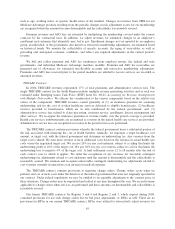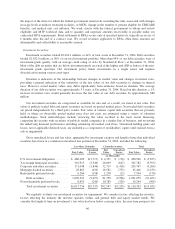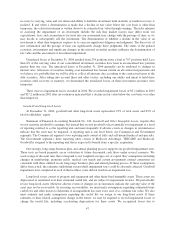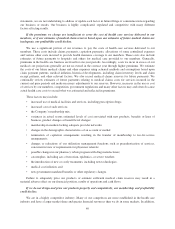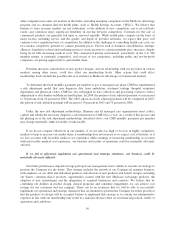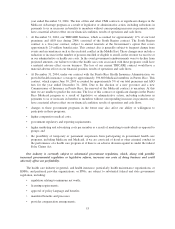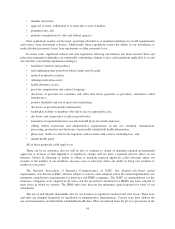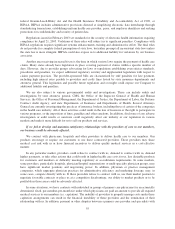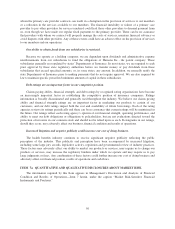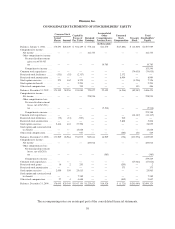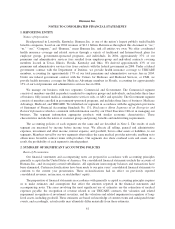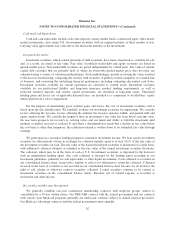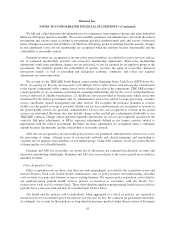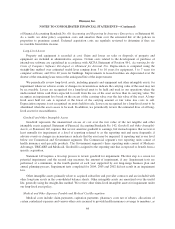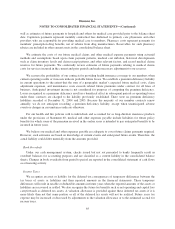Humana 2004 Annual Report Download - page 65
Download and view the complete annual report
Please find page 65 of the 2004 Humana annual report below. You can navigate through the pages in the report by either clicking on the pages listed below, or by using the keyword search tool below to find specific information within the annual report.federal Gramm-Leach-Bliley Act and the Health Insurance Portability and Accountability Act of 1996, or
HIPAA. HIPAA includes administrative provisions directed at simplifying electronic data interchange through
standardizing transactions, establishing uniform health care provider, payer, and employer identifiers and seeking
protections for confidentiality and security of patient data.
Regulations issued in February 2003 set standards for the security of electronic health information requiring
compliance by April 21, 2005. Violations of these rules will subject us to significant penalties. Compliance with
HIPAA regulations requires significant systems enhancements, training and administrative effort. The final rules
do not provide for complete federal preemption of state laws, but rather preempt all inconsistent state laws unless
the state law is more stringent. HIPAA could also expose us to additional liability for violations by our business
associates.
Another area receiving increased focus is the time in which various laws require the payment of health care
claims. Many states already have legislation in place covering payment of claims within a specific number of
days. However, due to provider groups advocating for laws or regulations establishing even stricter standards,
procedures and penalties, we expect additional regulatory scrutiny and supplemental legislation with respect to
claims payment practices. The provider-sponsored bills are characterized by stiff penalties for late payment,
including high interest rates payable to providers and costly fines levied by state insurance departments and
attorneys general. This legislation and possible future regulation and oversight could expose our Company to
additional liability and penalties.
We are also subject to various governmental audits and investigations. These can include audits and
investigations by state attorneys general, CMS, the Office of the Inspector General of Health and Human
Services, the Office of Personnel Management, the Department of Justice, the Department of Labor, the Defense
Contract Audit Agency, and state Departments of Insurance and Departments of Health. Several Attorneys
General are currently investigating the practices of insurance brokers, including those of certain of the companies
in the health care industry. All of these activities could result in the loss of licensure or the right to participate in
various programs, or the imposition of fines, penalties and other sanctions. In addition, disclosure of any adverse
investigation or audit results or sanctions could negatively affect our industry or our reputation in various
markets and make it more difficult for us to sell our products and services.
If we fail to develop and maintain satisfactory relationships with the providers of care to our members,
our business could be adversely affected.
We contract with physicians, hospitals and other providers to deliver health care to our members. Our
products encourage or require our customers to use these contracted providers. These providers may share
medical cost risk with us or have financial incentives to deliver quality medical services in a cost-effective
manner.
In any particular market, providers could refuse to contract with us, demand to contract with us, demand
higher payments, or take other actions that could result in higher health care costs for us, less desirable products
for customers and members or difficulty meeting regulatory or accreditation requirements. In some markets,
some providers, particularly hospitals, physician/hospital organizations or multi-specialty physician groups, may
have significant market positions and negotiating power. In addition, physician or practice management
companies, which aggregate physician practices for administrative efficiency and marketing leverage, may, in
some cases, compete directly with us. If these providers refuse to contract with us, use their market position to
negotiate favorable contracts or place us at a competitive disadvantage, our ability to market products or to be
profitable in those areas could be adversely affected.
In some situations, we have contracts with individual or groups of primary care physicians for an actuarially
determined, fixed, per-member-per-month fee under which physicians are paid an amount to provide all required
medical services to our members (i.e. capitation). The inability of providers to properly manage costs under these
capitation arrangements can result in the financial instability of these providers and the termination of their
relationship with us. In addition, payment or other disputes between a primary care provider and specialists with
55


